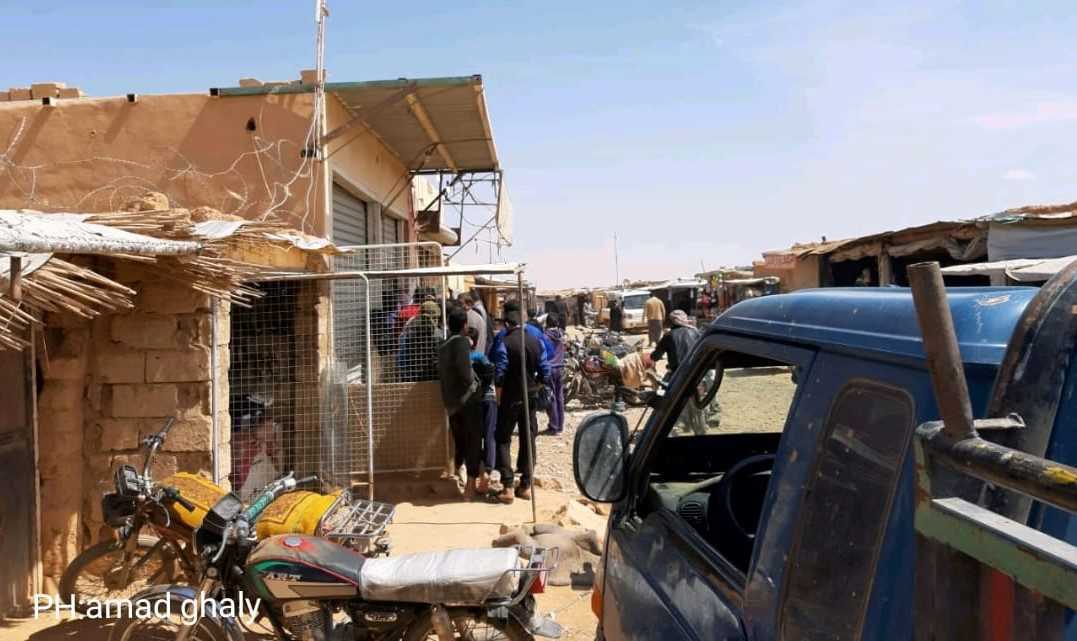No flour for days in Al-Rukban: Residents fear famine amid growing food shortages in Syria
“We have had no bread in seven days because no flour reaches the camp. If the situation continues like this, we will die here of starvation.”
4 February 2021
Residents of al-Rukban stand out a bakery in the camp to get bread, 26/3/2020 (Imad Ghaly)
AMMAN — “We have had no bread in seven days because no flour reaches the camp. If the situation continues like this, we will die here of starvation,” Abu Ahmad (a pseudonym), a resident of al-Rukban camp, texted Syria Direct on Friday.
Following a regime crackdown on smugglers, access to bread decreased drastically over the past two weeks, several camp residents told Syria Direct. Many worry this unprecedented shortage forecasts a more severe crisis induced by growing food shortages in regime-held areas.
Stranded at the border between Syria and Jordan since 2014, Rukban’s residents chose life in a desolate desert camp over an uncertain return to regime-held Syria.
Damascus tightly controls all attempts to provide humanitarian assistance to opposition pockets like al-Rukban. The last time a UN convoy reached the camp was 2019. On the other side, Jordan almost entirely sealed off access to the camp in 2016 in response to an attack against members of the Jordanian armed forces. No INGOs operate inside al-Rukban.
Smuggling: A lifeline at risk
In the absence of aid, networks of smugglers – affiliated with opposition armed groups active in the area – are a lifeline. But smugglers face increasing difficulties obtaining flour, a direct consequence of Syria’s dire economic situation, especially in the regime-held territories.
“The regime prevents the transfer of subsidized flour between the provinces under its control,” Imad Ghaly, a media activist residing in the camp, told Syria Direct. The owners of vehicles caught transporting flour between two areas face high fines and prison. “Smugglers became afraid to take bread to al-Rukban,” Ghaly added, “especially since they need to cross regime checkpoints.” In parallel, food prices have skyrocketed on the black market, pushing up prices in the camp.
While the situation has deteriorated over the past weeks, the exact reason for this sudden and prolonged interruption of the flour supply is unclear. “According to what we heard, it is the closure of a road connecting the camp to Homs,” Abu Khaled al-Homsi, a 40-year-old al-Rukban resident, told Syria Direct. Others speak of a targeted crackdown against smugglers. “A smuggler was arrested by the Fourth Division [headed by Bashar al-Assad’s brother Maher], and we no longer know anything about him,” Abu Ahmad said.
This crisis, according to Abu Khaled al-Homsi, “is different and more frightening to us because it is not merely an issue of regime pressure against the camp. This time, it is directly related to the bread crisis of the regime. As flour is smuggled into the camp from regime areas, there is no alternative.”
“There are only two bakeries in the camp. If the flour stops, the bakeries stop,” Mustafa al-Homsi, a 50-year-old originally from the countryside of Homs, told Syria Direct. Due to the shortage, only one bakery is operating. The price of a bag of bread, weighing around 800 grams, rose by 50%, from SYP 1,000 ($0.33, according to the exchange rate in the parallel market of SYP 3,085 per dollar) to SYP 1,500 ($0.49).
So far, the shortage has been mitigated by the fact that several camp residents store flour at home and bake their own bread due to the limited capacity of the camp’s bakeries. In addition, alternatives (such as rice and bulgur) remained available. A small quantity of flour entered the camp on Sunday, “enough to cover the needs of the residents for one week only,” according to Abu Ahmad.
No help in sight
“The humanitarian situation for people in Rukban is without question deeply concerning,” the UN Office for the Coordination of Humanitarian Affairs (OCHA) told Syria Direct. “The UN continues to engage parties to identify durable solutions for those still living in Rukban and continue to call on all parties to provide safe, sustained and unimpeded humanitarian access to those living in Rukban, as well as to all people in need throughout Syria.”
UNICEF, which led the delivery of past aid shipments to al-Rukban, told Syria Direct there are “ongoing negotiations to get aid delivered to Rukban and other hard-to-reach areas in Syria.” But an anonymous donor, who has supported the camp independently for years, doubts aid will come in the near future: “[The UN agencies] have been ‘working on it’ for two years,” the donor told Syria Direct.
“We lost hope in the United Nations,” an official of the Civil Administration in al-Rukban camp, who asked to remain anonymous, told Syria Direct. “We communicate daily with [their] office in Damascus, as well as the Amman office, but they do not have access to al-Rukban.”
Some residents said they do not want unreliable inconsistent humanitarian assistance but rather the ability to purchase flour from across the border. “The crisis can only be solved by securing flour from a second source, which might be Jordan,” the official from the Civil Administration added. “But the problem is that Jordanian authorities prevent aid from entering the camp.”
In the meantime, disillusion grows inside al-Rukban. “Our camp is in a very tragic condition,” Mustafa al-Homsi concluded. “Those who have money live – and they are few. The majority do not have money and survive – as they say – as a result of the absence of death.”







